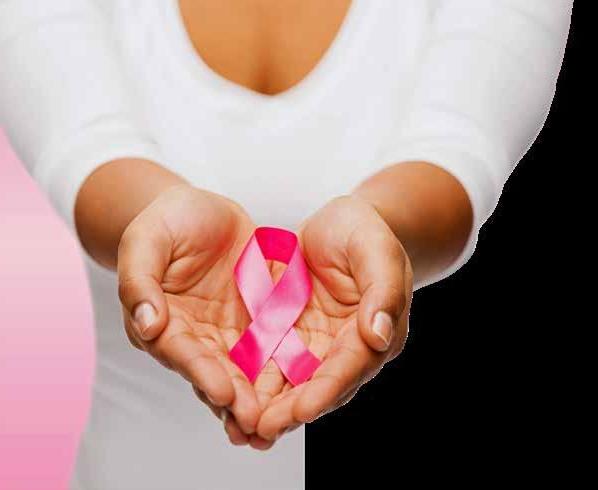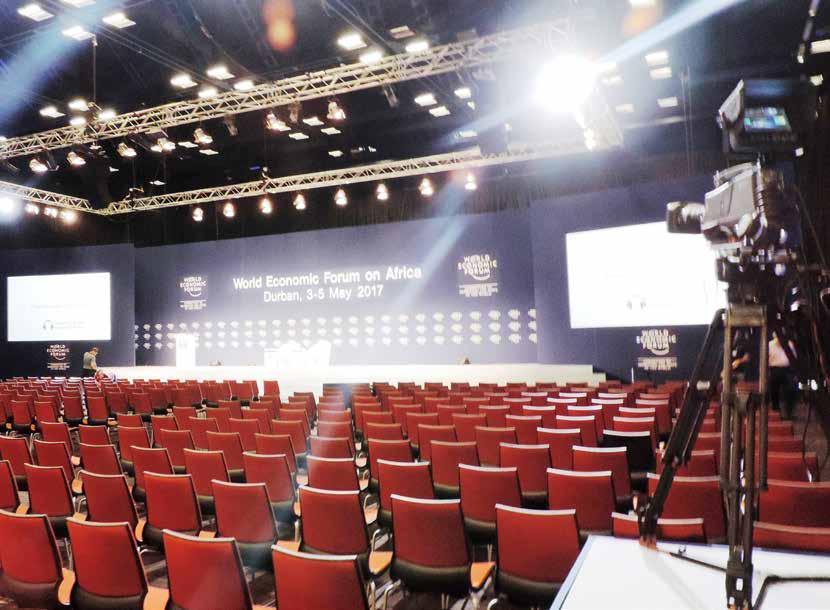
15 minute read
Fighting spirit

spirit FIGHTING
Advertisement



With messages of resilience and inspiration, Meetings hears from some of our Top Women in MICE on beating the Big C.
VANESSA PERUMAL Managing Director, JT Communications
TOP WOMEN IN MICE JUDGE 2020+2021

In March 2019, I developed a very bad flu that would not get better no matter how many doctors I visited. I went for X-rays and tested for symptoms ranging from swine flu and bronchitis to laryngitis, pneumonia and asthma, until I eventually saw Dr Ismail, an ear-nose-and-throat specialist, in October last year. I am a strategist and very good at what I do, and I knew something was wrong. When Dr Ismail said it looks like it’s spasmodic dysphonia – even though I had been tested for cancer and it did not show in any of the scans and X-rays – the C-word was always at the back of my mind. On 9 May 2020, I was diagnosed with chondrosarcoma, which is a rare cancer derived from transformed cells that produce cartilage. Mine was in my larynx and did not show in any of the scans. My journey has included many months of testing, which, oddly enough, has also been filled with adventure. Between December 2018 and my operation this year on 13 May, I travelled to Cuba, Mexico, New Orleans, Abu Dhabi, Mumbai, Chennai, Sri Lanka, Durban, the Kruger National Park – I even went to Finland on a media tour. All with my illness. I really battled climbing the mountains in Sri Lanka and there were times I thought I would die from breathlessness. I had no idea that I had a rare form of cancer; by the time I went for my operation, I was barely able to breathe in 5% of air. Learning I had cancer and would undergo major surgery with just four days’ notice was, personally, the greatest challenge. The news came during Covid-19’s most severe lockdown, which was very tough for my family. Because of social distancing, no physical contact was allowed,




which was really difficult, and launching a blog on Facebook called ‘Miraculous Moments’ was one of the best decisions we made as a family – the outpouring of love, generosity and prayers from people around the world continues to be our inspiration and offered us the hope we desperately clung on to in such desperate times for me and my family. People say I am resilient but, truth be told, without the compassion and ubuntu shown to us, we just would not have coped. Leading up to my operation, hundreds of people throughout South Africa, the continent and from across the world reached out and prayed for me and my family. People responded in so many ways. From strangers cooking meals and reaching out to us, to online connections with people responding so positively and offering to help. Even on the day of operation, my family and friends camped outside the hospital. I was admitted for 24 days and, barring two days in the general ward, I spent all my time in ICU. Dr Ismail proved to be my lifeline in so many ways. His visits and keeping in touch with my family were so helpful. Trading my voice box meant I had to find other ways to communicate, mostly relying on writing notes and using an app called Speak, which was extremely difficult. The hardest part for me as a communicator having studied journalism and running my own agency is not being able to speak. While I am grateful to God for my second chance, losing my vocal cords is more challenging than I ever imagined. It has been just over two months since my operation. Having survived a life-threatening cancer but also having to trade my voice has offered me a new perspective of living life with a second chance. I am learning that both the medical sector and everyday folk know so little about people living


with my condition, and educating people is at the core of how I also want to use the ‘new normal’ I find myself living in. I am learning that some things are constant, whether you have a life-threatening medical condition or not. Even when I was so ill, having people treat me with dignity was important. As I recover, now more than ever, I am seeing how imperative it is to use one’s voice to speak out against issues such as corruption, indignity and gender-based violence, and to stop supporting mediocrity. I went into my op with human rights development and social justice at the core of the work I do and, as I recover during the Covid-19 pandemic, it has made me realise that it is time to fix the mess we enable. I hope we can use our platforms to influence good governance, share more widely and make sure our country becomes the best place to live in. I am so fearful of Covid-19, even more so than the cancer that was in my body. News reports are so full of doom and gloom, and not seeing family and friends is hard on everybody. As an entrepreneur, I realise how important it is to create jobs and have sufficient cash flow. More people will die of mental illness, poverty and the social ills, which, as a result, escalates violence against women and children. You might think that someone who has a second chance in life would want to just sit by the ocean or hike on mountain tops or spend days in wildlife sanctuaries but the greatest lessons I am learning is that having humanity live in harmony and world peace is even more necessary now than ever before. If you are feeling helpless, find a way to be more purpose-driven – it may just be the resolve you need to keep you going.


JEANA TURNER Co-founder and Relationship Builder, Hospitality Zone TOP WOMEN IN MICE AWARDEE 2016
In 2016, I was a fitness freak (yes, me). I was spending my weekends on my bicycle and going to CrossFit three times a week with my son. I honestly loved those days of pushing my body. Then, during a visit to the doctor in October 2016 with my son Jordan, who was showing flu symptoms, I asked our GP to also take a quick look at me as I had a sore throat, and so started my journey to being diagnosed with Stage 1 papillary thyroid cancer with a follicular variant. They called it the ‘good’ cancer – imagine, that’s actually a thing! When I look back at the journey of being diagnosed and the subsequent decision to have a total thyroidectomy in May 2017 followed by post-operative care, although dreadfully scary, was a complete no-brainer. The resounding thought in my head was: “I have a son to care for – I have no choice but to survive this.”





For me, the hardest part of my Big C journey was learning to live without a thyroid. I don’t think we give the little gland at the base of our neck much thought at all, but I quickly learnt that this butterfly-shaped organ is vitally important to each breath we take, influencing the function of many of our body’s most important organs, including the heart, brain, liver, kidneys and skin, as well as our moods, energy levels and metabolism. It has been a remarkable uphill journey; it has been both stressful and emotional to get the correct medication to replace my thyroid functions, but, three years later, I am alive to tell the tale and cancer-free. Reflecting on the last few years, pondering how I got through it all, five things stand out. • Embracing change: This took me a while. Accepting the fact that I’m not quite the same, but that I can be just as functional. • Support: Family, friends and colleagues who allowed me to feel sick and were at my side through my most difficult and darkest days. • Education: I spent many hours, days and months reading and trying to understand what was happening to my body. This became a standing joke in our house:
“Mom, what are you doing?” my son would ask, to which I would respond: “Guess, Jordan…” – invariably,
I was reading yet another thyroid-related article. • Taking action: Many rands and four doctors later, I found a doctor who, instead of questioning and doubting my research, listened to me and worked with me to help me feel better. • A reason to live – goals: Knowing that I have a purpose, having faith and an attitude of “I won’t give up, until I feel better”, helped me through my journey. Writing this has been a wonderful reminder that, even though we are faced with tough times, I am be resilient, I will get through this and I will not give up.


LINDSEY VERFAILLIE Senior Sales Coordinator, Durban ICC TOP WOMEN IN MICE AWARDEE 2019
In July 2006, came the alarming news that I had cancer. For a brief moment, I thought my world would come crashing down around me – I say a brief moment because that’s how long I let the news affect me. I looked up and saw my mother in tears. My amazingly strong mother was so heartbroken that I knew I now needed to be strong. My parents raised me in a loving environment, and my mother would go on and on about being strong and not a weakling. Growing up, I had never thought of myself as being a strong character because I was always a ‘softy’ but, nonetheless, I always tried to do the opposite. Little did I know then that her approach would be the thing I drew strength and resilience from in my darkest moment; that looking at her for that brief moment would allow me to say, “I got this”, and turning to my mother and father, I said, “Mom and Dad, I am going to beat this.” My mother was my amazing rock and my father was my anchor; my son was my sunshine and my family and friends were my courage. This was my foundation for getting me through the two years that lay ahead. The combination of the love and support from my amazing family and friends, doctors and all my Durban ICC colleagues was truly what helped me find the strength to beat cancer. I took each drip, procedure and result day by day, with their prayers to comfort and support me. I believe that a family is made up of all the people in your life and this is what helped me get through my illness. Resilience came from all the abundance of love and support that I received and continue to receive in my life. I can’t imagine anyone going through something as serious as cancer on their own and I always think of the famous song by





The Beatles, ‘All You Need is Love’, which could not be truer for the time we find ourselves living through.
THE INTERNATIONAL AFRICAN

At the end of June, Justin Hawes was appointed as the first president from Africa of the International Federation of Exhibition & Event Services. He shares his vision for the association in an exclusive conversation with Meetings.
Justin Hawes is a name familiar to most within the business events industry – Scan Display, where he is managing director, is somewhat of a household name itself.
Many know that Justin has roots firmly entrenched in the local market but what some may not realise is just how wellestablished Scan Display is beyond South Africa’s borders.
“I started Scan Display 23 years ago and we now have four branches in South Africa, with branches in Rwanda, Botswana and distributors throughout Africa,” says Justin.
The company has also been able to work on projects in both Europe and the USA, largely owing to the network it has established through the International Federation of Exhibition & Event Services (IFES).
“My journey with IFES began in 2005, when I was visiting Euroshop and saw the impressive IFES stand at the show. I got chatting to Larry Kulchawik, who was, at that time, the incoming president of IFES. He encouraged me to attend the IFES World Summit later that year in London, which I did,” Justin recalls.
GOING GLOBAL For Justin, the opportunity to network with international counterparts on a global platform for the first time was “fantastic”.
“My company, Scan Display, became a member of IFES that year, making us the association’s first African member.”
Justin is a numbers man and as a qualified Chartered Accountant, the bottom line counts for a great deal in his books.
“I have been the IFES treasurer since 2014 and vice president since 2017. I was IFES’s first board member from a developing country
WHAT IS IFES?
IFES is the international federation representing national associations and individual companies that supply services to the global exhibition and events industries. Through the IFES network, members are able to realise new business opportunities within the exhibitions space, thus growing the industry on a global scale. For more information, visit ifesnet.com
and its first African board member, which is a great privilege for me, and my association with IFES over the years has been incredibly rewarding,” reflects Justin.
On 25 June 2020, during an IFES AGM that saw representation from more than 100 members on a Zoom call and 40 members in Hannover, Germany, Justin was elected as president of the association for the 2021/22 period.
“I am grateful to the board and members for giving me this opportunity as we navigate the way forward in the global exhibitions industry,” enthuses Justin.
THE THREE Rs As Justin prepares to assume the role of IFES president, he uses the analogy of a potjie pot and its three legs to describe his approach, with each leg representing an ‘R’.
“The first R is for retaining membership,” explains Justin.
“IFES has worked very hard to grow its membership over the years and now we need to work hard to retain our members, who are our lifeblood. We need widespread membership representation to give the association credibility and we need strong membership numbers for our sustainability; however, we also need to be sensitive to our members’ cash flow constraints at this very difficult time,” he adds.
Using the AGM to illustrate the next R, Justin emphasises that relevance in light of the current pandemic is key.
“IFES needs to make sure it continues to provide a relevant offering for its members. We need to adapt for these difficult times, and I think we have already done a good job of this in the last couple of months. This hybrid AGM, with members in Hannover, and the rest on Zoom, is a great example of how we have adapted to the current situation,” he says.
Justin uses the last R to highlight the importance of research, which, according to him, will enable the association to take stock of the global exhibitions industry represented
by the association’s members, as well as assist with identifying the countries representing the biggest markets in terms of monetary value.
“This will guide us in terms of the countries where we need to grow membership. One of the major benefits of being an IFES member is the network of partners one develops throughout the world,” elaborates Justin.
The IFES network is referrals based and researching and measuring the monetary value of the referral work that IFES provides to other IFES members will help establish how members benefit from being part of this network.
“Once we know the monetary value of the IFES member referrals, we can use this information to recruit new members and encourage members to work with each other,” says Justin.
“We know that there are some challenging times ahead of us but IFES is a strong association with a committed membership. We are an adaptable group of people, as required by the nature of the work we do, and we will come through this. I believe IFES has an important role to play as we navigate our way through the next year,” he concludes.








